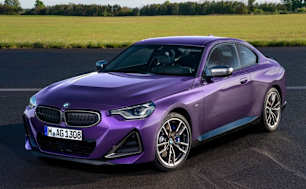Interior dimensions may not be paramount to most coupe purchasers, but a stylish one with quality fittings and generous equipment levels certainly is, and here the M240i is bang-on brand.
For a compact two door, the M240i is pleasingly accessible. Long doors and a tallish roof help entry/egress, into a 2+2 cabin that obviously prioritises front-seat occupants. And it does that exceedingly well.
There's space to stretch – even if you're two metres tall – up front, as long as the rear seats aren't occupied, as a result of generous leg and shoulder room, while headroom should also be sufficient, even with the sunroof fitted. We're talking about a small coupe, remember, so that's impressive.
Vision out isn't as bad as you might imagine, either, due to the airiness that the elongated side windows provide. There are blind spots, though, with the B-pillar being the worst, but at least the extensive camera and sensor network surrounding the car provide reassuring back-up.
The handsome M Sport front seat option ($2000 extra) look like they mean business, providing all the comfort, support and adjustment most occupants will ever need. They're firm enough when you need them yet restfully supple all the time. Backed up by a multitude of electronics, both buckets will brace people of pretty much all sizes, while the driver has the luxury of two memory settings that also take in mirror positions.
Remember how the new 2 Series comes via Mexico? You'd never know it wasn't built in Germany, from the solid build quality and expensive materials to the extremely welcome absence of squeaks and rattles. No area exposed to the occupants looks or feels cheap.
Also meeting expectations is the dashboard itself, which is essentially a scaled-down replica of every recently released BMW – futuristic and fabulous iX aside – since the current (G20) 3 Series in 2018 broke the Bangle-era curse of disappointing new-millennial models.
If you're hoping for a return to classic analogue instrument dials, forget it. The M240i's instruments are modish electronic items, providing plenty of vehicle and driving data, and supported by an excellent head-up display. Like the switches and buttons, they're easy to fathom, with little familiarisation required.
As we've said repeatedly in other BMW reviews, the iDrive multimedia controller is amongst the best in the business, responding instantly to inputs. The other basics – ventilation, storage, driving position – are also first class. Nothing to complain about here. The company is on a good thing and it's sticking with it.
Accessing the rear seats is aided by electrified front seats that slowly whir forward, to provide a big-enough aperture for your medium-build 178cm tall tester to squeeze in.
Once sat, with legs splayed apart, there's just enough space for another person of similar height and proportions, as well as surprisingly decent levels of vision thanks to the narrow front bucket seats and extended rear glass area, to offset any feelings of claustrophobia.
BMW has also provided several welcome amenities, including face-pointed rear vents with full single-zone temperature control to serve two occupants back there, armrests (with the centre fold-down item also packing in a pair of cupholders), reading lights and coat hooks.
Sadly, however, the rear windows do not retract, and the thick door pillars are fixed, so you cannot enjoy a pillarless hardtop experience. That's what the M4 coupe (and convertible too) is for.
While rear-seat space is adequate, with enough room for shoulders, thighs and feet if the front-seat occupants don't mind raising the cushion a little, the backrest is too upright to be considered comfortable on longer journeys. At least the low cushion is scalloped enough to provide some support, though, again, not over extended periods.
That rear backrest folds, by the way, to a 40/20/40 split, providing access into the 390-litre boot while still able to accommodate a single passenger. The lid opens up and wide, offering up a long, flat and wide space for storage. Along with a 12V outlet and tie-down hooks, you'll find a tyre-repair kit, since no spare wheel is carried.






